Excellent information, not crazy about the delivery.
Really not crazy about it.
I remember liking the Masks of God series a lot more when I was a teenager, but on a recent 2nd run-through I found it somewhat less satisfying. It made me feel unclean for liking Campbell in the first place, actually.
Why?
For one thing, Oriental Mythology is replete with massive amounts of information and anecdotes concerning various Eastern religions, but Campbell makes it quite clear where his personal judgments reside. This is where Comparative Mythology becomes something more like "Competitive Mythology". Apparently some religions are simply better than others. Some are more sophisticated. Some are more mature. (According to Campbell, these would be the religions of the West.) And the man gets very patronizing when he describes some of the quaint 'Oriental' myths that fail to measure up, so to speak.
The part I liked: as usual, I did enjoy some of the material taken directly from sacred texts. Good stuff, although where Campbell takes his interpretations is often a different matter.
Note: This is also the volume where I invented the Joseph Campbell Masks of God drinking game.
(You are strongly advised not to try it. I'm fairly sure it leads to fatal alcohol poisoning.)
Anyway, it's fairly simple. Every time Joseph Campbell mentions one of the following, you must take a drink: The Decline of the West by Oswald Spengler, Thomas Mann, or Nietzsche.*
One final thought: Joseph Campbell fervently fondled the words of great men (not women, never any women!) men like Nietzsche, Spengler, and company.. and he was NOT sorry. He was possibly their greatest fan. They are the glorious shining bricks in this pompous monolith of mythological dissection.
This series is the sort of thing that begs to be read aloud at your next DMV visit or on public transport of your choice. Make a fun game out of it. Who will beat you to death with their shoe first?
* For total obliteration, add James Joyce and Freud
The Masks of God, Vol. 2: Oriental Mythology review
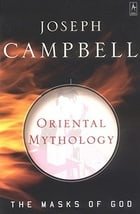 Posted : 11 years, 9 months ago on 5 September 2013 10:10
(A review of The Masks of God, Vol. 2: Oriental Mythology)
Posted : 11 years, 9 months ago on 5 September 2013 10:10
(A review of The Masks of God, Vol. 2: Oriental Mythology) 0 comments, Reply to this entry
0 comments, Reply to this entry
Egypt: The Book of Chaos review
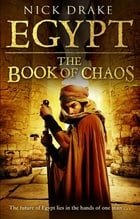 Posted : 11 years, 9 months ago on 5 September 2013 08:25
(A review of Egypt: The Book of Chaos)
Posted : 11 years, 9 months ago on 5 September 2013 08:25
(A review of Egypt: The Book of Chaos)There's a lot going on in this book: secret missions, conspiracies, ancient politics & diplomacy, serial killers, and betrayals both expected and unexpected. An engaging mix of historical action-adventure and mystery noir, and a strong finish for the series.
PS: I especially enjoyed the glimpse into the culture and politics of the Hittite Empire.
PS: I especially enjoyed the glimpse into the culture and politics of the Hittite Empire.
 0 comments, Reply to this entry
0 comments, Reply to this entry
Tutankhamun: The Book of Shadows review
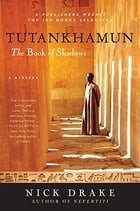 Posted : 11 years, 9 months ago on 3 September 2013 12:55
(A review of Tutankhamun: The Book of Shadows)
Posted : 11 years, 9 months ago on 3 September 2013 12:55
(A review of Tutankhamun: The Book of Shadows)Nick Drake's first mystery novel, Nefertiti, was intriguingly atmospheric but failed to provide anything more than a tottering, malnourished waif of a mystery plot. This sequel is more assured,yet it still has Drake's poetic touches to make it unique. Detective Rahotep's world-weary, cynical leanings come off a bit more smoothly on this second outing and I feel like I'm starting to get to know the guy. This is a satisfying mystery with a gritty, dark-edged Ancient Egyptian setting.
 0 comments, Reply to this entry
0 comments, Reply to this entry
Nefertiti: The Book of the Dead review
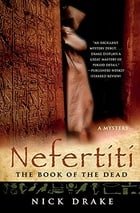 Posted : 11 years, 9 months ago on 3 September 2013 10:30
(A review of Nefertiti: The Book of the Dead)
Posted : 11 years, 9 months ago on 3 September 2013 10:30
(A review of Nefertiti: The Book of the Dead)An Egyptian detective is ordered by Pharaoh Akhenaten to locate his missing queen, Nefertiti. Evil machinations are afoot of course, but the actual mystery is fairly weak. However, this book does succeed in creating a very unique sense of atmosphere. Interesting start to the series.
 0 comments, Reply to this entry
0 comments, Reply to this entry
The Heretic Queen: Heiress of Misfortune, Pharaoh's Beloved review
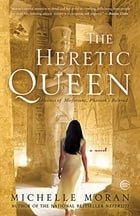 Posted : 11 years, 9 months ago on 2 September 2013 09:59
(A review of The Heretic Queen: Heiress of Misfortune, Pharaoh's Beloved)
Posted : 11 years, 9 months ago on 2 September 2013 09:59
(A review of The Heretic Queen: Heiress of Misfortune, Pharaoh's Beloved)I found this enjoyable enough, though it wasn't a blockbuster historical novel by any means. Nefertari, niece of Nefertiti, has to win her way into the good graces of the Egyptian people and defend herself against the wily machinations of an evil high priest. (He's even got an evil eye.) Plus there's plenty of jealousy and back-biting from a rival wife to keep things boiling along. This is light reading, good for when you want something that will move quickly. Just don't expect any deep philosophical conundrums, intricate characterizations, or strict historical accuracy.
 0 comments, Reply to this entry
0 comments, Reply to this entry
Nefertiti: A Novel review
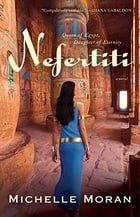 Posted : 11 years, 9 months ago on 28 August 2013 10:25
(A review of Nefertiti: A Novel)
Posted : 11 years, 9 months ago on 28 August 2013 10:25
(A review of Nefertiti: A Novel)Mutnodjmet, the quiet and unambitious younger sister of Nefertiti, gets roughly catapulted into the devious world of Egyptian courtly life when Nefertiti becomes the Queen Consort of the radical pharaoh Akhenaten. Solid historical outing, with plenty of melodrama and richly imagined scenes of Ancient Egyptian life.
I have only one small complaint. I thought the author took an easy route with her depiction of Akhenaten as a spoiled, issue-laden tyrant. He was a complex guy and though he makes a reasonably good villain, I don't think we get a good insight into why he turned the entire religion of Egypt upside down and built a city out in the middle of nowhere. He was acting out against his father? Really?
Still, it's very engaging and in some places downright moving. Recommended.
I have only one small complaint. I thought the author took an easy route with her depiction of Akhenaten as a spoiled, issue-laden tyrant. He was a complex guy and though he makes a reasonably good villain, I don't think we get a good insight into why he turned the entire religion of Egypt upside down and built a city out in the middle of nowhere. He was acting out against his father? Really?
Still, it's very engaging and in some places downright moving. Recommended.
 0 comments, Reply to this entry
0 comments, Reply to this entry
Sister Wendy's Story of Painting review
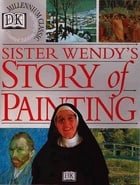 Posted : 11 years, 9 months ago on 28 August 2013 09:26
(A review of Sister Wendy's Story of Painting)
Posted : 11 years, 9 months ago on 28 August 2013 09:26
(A review of Sister Wendy's Story of Painting)Fantastic, in-depth overviews of famous paintings by our favorite lisping nun. I also really like the illustrations and lay-out. The publisher, Dorling-Kindersley, can usually be relied upon to produce quality work, especially when it has a strong visual element. Almost any of their art-related books are worth picking up.
 0 comments, Reply to this entry
0 comments, Reply to this entry
Sarum: The Novel of England review
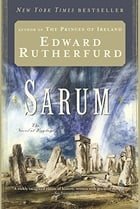 Posted : 11 years, 9 months ago on 28 August 2013 08:41
(A review of Sarum: The Novel of England)
Posted : 11 years, 9 months ago on 28 August 2013 08:41
(A review of Sarum: The Novel of England)A truly successful epic novel*, one that covers very long periods of time, is a tricky undertaking. You have to provide enough information to feed the appetites of history buffs, but you also have to balance that with a convincing human story. Rutherfurd doesn't quite achieve that balance.
Long time spans in a novel require a circus truckload of diverse characters. And at least a third of those characters have to be rich and interesting rather than an endless line-up of Whats-His-Name, So-and-So, Bad Guy, Good Girl, That-Weird-Dude-Again, etc. Rutherfurd's characters are more of the latter, unfortunately. There are a couple of stand-outs but the author gave each generation of the novel's core families repetitive traits (stuff like unusually long toes, short stature, criminality, etc.)causing them to blur together. I got a bit tired of each family replaying varied iterations of its genetic destiny. (The short guy always gets the short stick. Every. Single. Time. That one family is always nefarious. Always.)
The characters become less wooden outside of their personal dramas, when they're responding to larger patterns of political intrigue, plagues, changing technologies, and war over the centuries. That's where this book is at its best. The coming of the Black Death and the construction of Salisbury Cathedral were both particularly interesting.
So, to sum up: the historical part of this book gets an 8 out of 10, the novel part gets a 6.
* Truly successful epic novel usually = James Michener
Long time spans in a novel require a circus truckload of diverse characters. And at least a third of those characters have to be rich and interesting rather than an endless line-up of Whats-His-Name, So-and-So, Bad Guy, Good Girl, That-Weird-Dude-Again, etc. Rutherfurd's characters are more of the latter, unfortunately. There are a couple of stand-outs but the author gave each generation of the novel's core families repetitive traits (stuff like unusually long toes, short stature, criminality, etc.)causing them to blur together. I got a bit tired of each family replaying varied iterations of its genetic destiny. (The short guy always gets the short stick. Every. Single. Time. That one family is always nefarious. Always.)
The characters become less wooden outside of their personal dramas, when they're responding to larger patterns of political intrigue, plagues, changing technologies, and war over the centuries. That's where this book is at its best. The coming of the Black Death and the construction of Salisbury Cathedral were both particularly interesting.
So, to sum up: the historical part of this book gets an 8 out of 10, the novel part gets a 6.
* Truly successful epic novel usually = James Michener
 0 comments, Reply to this entry
0 comments, Reply to this entry
Centennial review
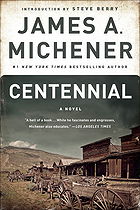 Posted : 11 years, 9 months ago on 28 August 2013 06:41
(A review of Centennial)
Posted : 11 years, 9 months ago on 28 August 2013 06:41
(A review of Centennial)A novel about Colorado and a large book in every sense of the word, Centennial is one of Michener's most successful outings. It boasts the humongous timeline we've come to expect from him, but the fiction itself rests on a solid foundation of fascinating historical facts. Exposition abounds, of course, but in this case it's well balanced against the human stories.
Michener starts with a somewhat didactic geology lesson and gamely presents us with the personal trials and tribulations of dinosaurs and early mammals, followed by.. um, beavers? Well, beavers can have rich and emotional inner lives, too. Heck, you can tell the man even did massive research into beavers. This is a very dedicated writer, folks.
Anyway, the human part of the book starts with the first inhabitants of the area, the Arapaho, and their initial encounter with whites. This portion has some of the most interesting characters, the Arapaho chief Lame Beaver and the intrepid French trader Pasqinel. These people are so colorful they must surely be based on real historical figures.
There's a particularly disturbing massacre about a third of the way through the novel (basically the Sand Creek Massacre). Sad that so little of the horrific details of this event had to be made up by the author. (Truth is often worse than any nightmare one can dream up.)
An impressive pageant of characters wander in and out the pages of this book; it'd be a slog to go through them all. You have your usual black hats and white hats, a generous amount of gray characters, and a generous sprinkling of under-developed walk on parts. It's an engrossing and informative read, not high literature, but by Michener standards pretty good.
Michener starts with a somewhat didactic geology lesson and gamely presents us with the personal trials and tribulations of dinosaurs and early mammals, followed by.. um, beavers? Well, beavers can have rich and emotional inner lives, too. Heck, you can tell the man even did massive research into beavers. This is a very dedicated writer, folks.
Anyway, the human part of the book starts with the first inhabitants of the area, the Arapaho, and their initial encounter with whites. This portion has some of the most interesting characters, the Arapaho chief Lame Beaver and the intrepid French trader Pasqinel. These people are so colorful they must surely be based on real historical figures.
There's a particularly disturbing massacre about a third of the way through the novel (basically the Sand Creek Massacre). Sad that so little of the horrific details of this event had to be made up by the author. (Truth is often worse than any nightmare one can dream up.)
An impressive pageant of characters wander in and out the pages of this book; it'd be a slog to go through them all. You have your usual black hats and white hats, a generous amount of gray characters, and a generous sprinkling of under-developed walk on parts. It's an engrossing and informative read, not high literature, but by Michener standards pretty good.
 0 comments, Reply to this entry
0 comments, Reply to this entry
Fire from Heaven review
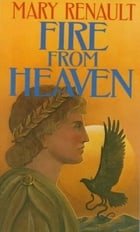 Posted : 11 years, 9 months ago on 26 August 2013 10:36
(A review of Fire from Heaven)
Posted : 11 years, 9 months ago on 26 August 2013 10:36
(A review of Fire from Heaven)Ahem...
So this book starts with Alexander as a young boy, in bed, playing with his pet snake. (Nudge, nudge, wink, wink.) Then his snake slithers away. He trundles off on his little toddler feet to search for it and wanders into his mother's room. (He really loves his mother. This is VERY important!) And then he sees his father naked.
Two words: SIGMUND FREUD.
On a billboard, approximately 900 feet tall, on a mountaintop, glowing with the brilliance of a thousand suns. Avert your eyes, lest you be blinded!
You know, if I'd quit after that first chapter (something I seriously considered), I wouldn't have known that the rest of the book is not nearly so heavy-handed. It's actually very adroitly-written, beautifully-researched, and fascinating. The masterful descriptions of places and people showcase Renault at the very top of her game. I really loved the interactions between Alexander and his lover/ best friend, Hephaestion, and the story of how Alexander tamed Bucephalus. It's a good novel, once you get past that first chapter.
So this book starts with Alexander as a young boy, in bed, playing with his pet snake. (Nudge, nudge, wink, wink.) Then his snake slithers away. He trundles off on his little toddler feet to search for it and wanders into his mother's room. (He really loves his mother. This is VERY important!) And then he sees his father naked.
Two words: SIGMUND FREUD.
On a billboard, approximately 900 feet tall, on a mountaintop, glowing with the brilliance of a thousand suns. Avert your eyes, lest you be blinded!
You know, if I'd quit after that first chapter (something I seriously considered), I wouldn't have known that the rest of the book is not nearly so heavy-handed. It's actually very adroitly-written, beautifully-researched, and fascinating. The masterful descriptions of places and people showcase Renault at the very top of her game. I really loved the interactions between Alexander and his lover/ best friend, Hephaestion, and the story of how Alexander tamed Bucephalus. It's a good novel, once you get past that first chapter.
 0 comments, Reply to this entry
0 comments, Reply to this entry
 Login
Login
 Home
Home 3 Lists
3 Lists 120 Reviews
120 Reviews Collections
Collections